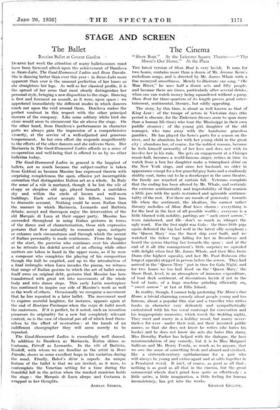The Cinema
Tim latest version of Show Boat is very lavish. It runs for two hours, contains more than a dozen of Mr. Jerome Kern's melodious songs, and is directed by Mr. James Whale with a fine moneyed smoothness. Merely to illustrate one song, " Ole Man River," he uses half a dozen sets and fifty people, and because there are times, particularly after several drinks, when one can watch money being squandered without a pang, Show Boat for three-quarters of its length proves good enter- tainment, sentimental, literary, but oddly appealing.
The story, by this time, is about as well known as that of King Lear : of the troupe of actors in Victorian days (the period is obscure, for the Zinkeisen dresses seem to span more than a human life-time) who tour the Mississippi in their own paddle steamer ; of the young girl, daughter of the old manager, who runs away with the handsome graceless gambler. He has played the hero's parts for a season on the river, and he abandons her with her young child in the great city ; abandons her, of course, for the noblest reasons, because he feels himself unworthy of her love and does not wish to involve her in his ruin. She gets an engagement at a Chicago music-hall, becomes a world-famous singer, retires in time to watch from a box her daughter make a triumphant debut on the New York stage, and since her husband, no older in appearance except for a few graceful grey hairs and a studiously shabby coat, turns out to be a doorkeeper in the same theatre, the family are reunited at curtain fall. Veterans complain that the ending has been altered by Mr. Whale, and certainly the extreme sentimentality and improbability of that reunion a little jars with the quite restrained and agreeable sentimen- tality of the rest. For there are moods of generosity towards life when the sentiment, the idealism, the earnest rather throaty melodies of Show Boat have charm : everything is for the best in the best of all possible worlds ; everyone is a little blurred with nobility, partings are " such sweet sorrow," tears rainbowed, and life--don't so much as whisper the ugly word. For the first night was Gala : the three little pigs again defeated the big bad wolf in the latest silly symphony : the ` Queen Mary' was the finest ship ever built, and we watched the ticker tape falling for her in Broadway and heard the syrens blasting her towards the quay ; and at the end of it all (the management's little surprise) we squealed with delight when first Mr. James Whale, and then Miss Irene Dunn (the highest squeals), and last Mr. Paul Robeson (the longest squeals) stepped in person before the screen. They had arrived in the ` Queen Mary ' just in time for Gala Night, and for two hours we too had lived on the ` Queen Mary,' the Show Boat, level, in an atmosphere of immense expenditure, of boat deck sentiment, of decorations lavish if not in the best of taste, of a huge machine grinding efficiently on, " sweet sorrow " at last at Ellis Island.
In reality, though, I cannot help preferring The Moon's Our Home, a trivial charming comedy about people young and too famous, about a popular film star and a traveller who writes books (a character very delicately and sympathetically caricatured with his too vocal Contempt for convention and his inappropriate memories, which wreck the wedding night). They meet and marry in a holiday mood, but marry never- theless for ever—under their real, not their invented public names, so that she does not know he writes (she hates his books) and he does not know she acts (he hates film stars). Miss Dorothy Parker has helped with the dialogue, the best recommendation of any comedy, but it is to Miss Margaret Sullivan and Mr. Henry Fonda, as much as to anyone, that we owe the sense, of something fresh and absurd and civilised, like a sixteenth-century epithalamium for a pair who will always be young and extravagant and at odds together in a Penshurst work'. It isn't, of course, as good as all that ; nothing is as good as all that in the cinema, but the great commercial wheels don't grind here quite so effortlessly ; little satire, a little imagination, a little feeling for human inconsistency, has got into the works.
GRAHAM GE2.."WE,










































 Previous page
Previous page